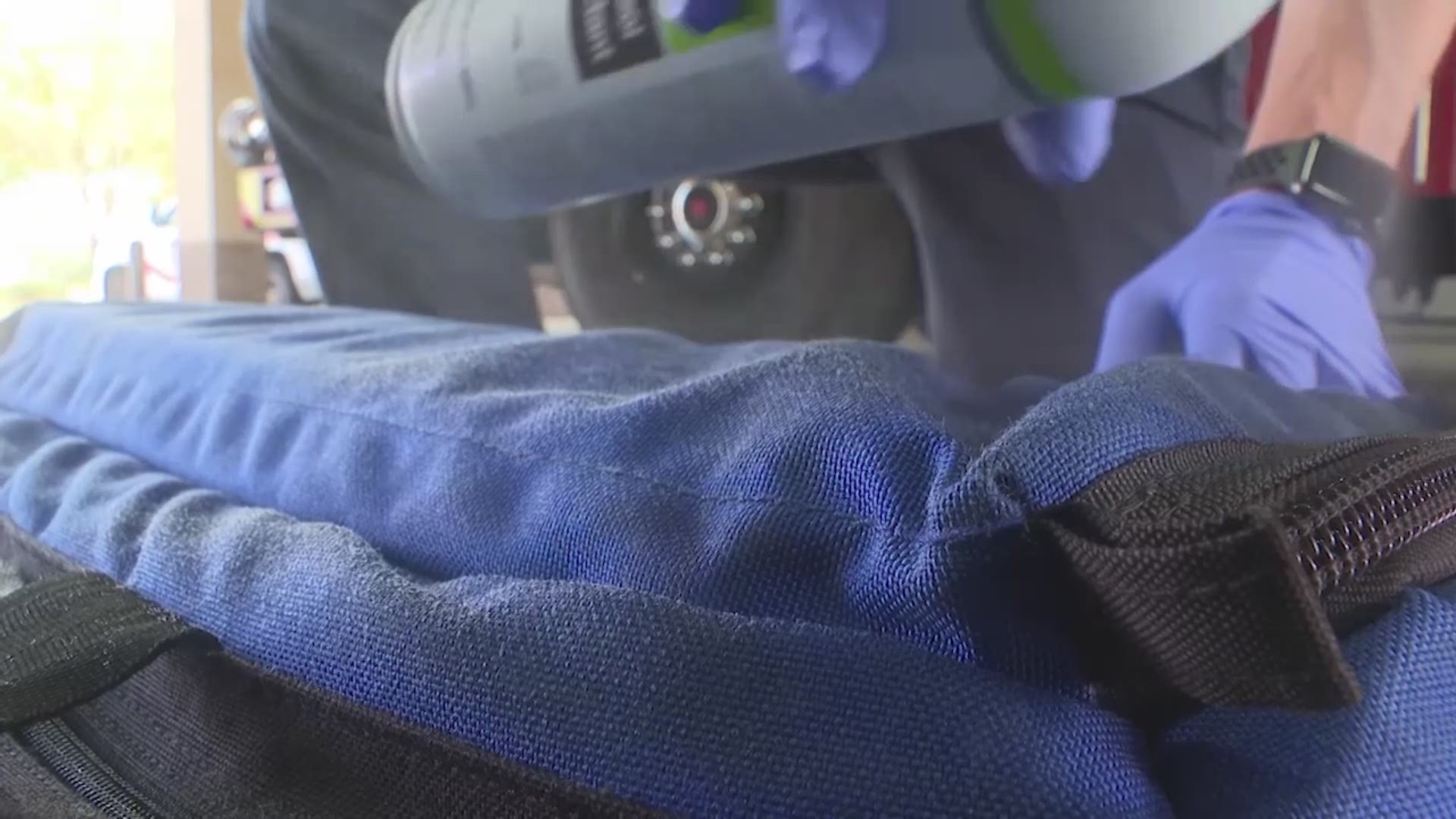HOUSTON — A University of Houston professor is waiting for FDA approval of a waterproofing solution that he says can shield personal protective equipment such as N95 masks from the droplets that spread COVID-19.
Professor Seamus Curran said he developed the hydrophobic coating in 2011 while testing it on fabrics. He continued creating similar solutions to be used on wood and masonry with his company, Integricote.
When COVID-19 broke out, he felt the coating could help, especially as health care workers warned of a nationwide shortage of personal protective equipment (PPE) such as N95 masks that health care workers wear.
"In terms of our supply chain, we just were not there," said Prof. Curran. "That's like going into a restaurant and saying, 'we don't have forks and spoons and plates.' This is not something that we die on the hill for. This is basic. Why don't we have this?"
RELATED: Harris County, Houston extend 'Stay at Home' orders through April 30 due to coronavirus concerns
“Its greatest threat is that it travels through a medium called water. Its greatest weakness is that it needs that medium to travel," said Prof. Curran.
That coating can be sprayed not only medical masks, but all kinds of personal protective equipment and porous surfaces, including beds, linens, and scrubs, Curran said.
Curran said masks would need to be sprayed, then allowed to cure and dry, a process that could take less than 10 minutes.
He said that it would be more effective for manufacturers to dunk masks in the coating in large batches, then allowed to cure and dry before packaging and shipping.
He believes using the coating can allow more health care workers to fight the virus, while others come up with a cure.
"Are we eradicating the virus? No, but we’re stopping it from getting through that barrier. It’s your first line of defense," said Curran.
Curran is still waiting on FDA approval, and said he can make 400 gallons a day. One gallon can coat 300-500 masks, Curran said.
Curran said that due to a lack of supplies, it was critical to develop a solution that could extend the lifespan of a mask, and also keep health care workers on the front lines safe while battling the virus.
He said that health care workers could wash and sterilize contaminated masks with harsh chemicals, and then re-apply this protective coating, extending the life of the precious N95 mask.
"I don't think anyone person has a solution, but I think all of us need to pull together," said Curran.
Coronavirus symptoms
The symptoms of coronavirus can be similar to the flu or a bad cold. Symptoms include a fever, cough and shortness of breath, according to the Centers for Disease Control. Some patients also have nausea, headaches and stomach issues.
Most healthy people will have mild symptoms. A study of more than 72,000 patients by the Centers for Disease Control in China showed 80 percent of the cases there were mild.
But infections can cause pneumonia, severe acute respiratory syndrome, kidney failure and even death, according to the World Health Organization. Older people with underlying health conditions are most at risk for becoming seriously ill. However, U.S. experts are seeing a significant number of younger people being hospitalized, including some in ICU.
The CDC believes symptoms may appear anywhere from two to 14 days after being exposed.
Human coronaviruses are usually spread through...
- The air by coughing or sneezing
- Close personal contact, such as touching or shaking hands
- Touching an object or surface with the virus on it, then touching your mouth, nose or eyes before washing your hands.
Help stop the spread of coronavirus
- Stay home when you are sick.
- Eat and sleep separately from your family members
- Use different utensils and dishes
- Cover your cough or sneeze with your arm, not your hand.
- If you use a tissue, throw it in the trash.
- Follow social distancing
Lower your risk
- Wash your hands often with soap and water for at least 20 seconds. If soap and water are not available, use an alcohol-based hand sanitizer.
- Avoid touching your eyes, nose, and mouth with unwashed hands.
- Avoid close contact with people who are sick.
- Clean and disinfect frequently touched objects and surfaces.
- If you are 60 or over and have an underlying health condition such as cardiovascular disease, diabetes or respiratory illnesses like asthma or COPD, the World Health Organization advises you to try to avoid crowds or places where you might interact with people who are sick.
Get complete coverage of the coronavirus by texting 'FACTS' to 713-526-1111.

